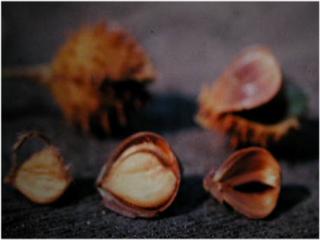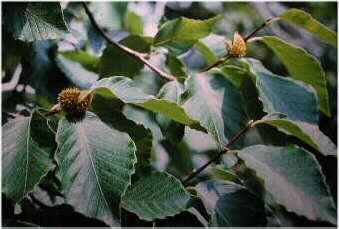| 09-15-03
One of the great features of fall is the ripening of beechnuts.
When one considers the fact that the kernel of a beechnut is so small
that it may defy the force of gravity--not to mention the taste buds of
man--it is difficult to imagine the import of this tiny seed.
But many things happen when beechnuts ripen--not the least of which
is the fact that this natural phenomenon can anchor me beneath the low
limbs of a beech tree where I shuck the twin hard inner shells out of their
spiny covers, then shave off one side with my thumbnail (or the smallest
blade of my Old Timer pocket knife) for a delightful woodland snack.
You will earn every tasty morsel you extract from a beechnut, but to
experience this beautiful, woodsy taste of a ripe beechnut is well worth
the effort . . . even the sore finger tips that will come with handling
the spiny outer shells of the nuts.
I never know quite where to start in describing beechnuts. But when
I think of the entire nut--including the spiny outer husks--I fancy
that they are half trapezoidal and half pyramidal--a sort-of three-dimensional
trapezoidal pyramid. The outer husks tend to split and yaw a bit as they
begin to dry on the ends of beech twigs. If left alone the outer husks
will open, as if hinged at their base, and the twin inner nuts, which remind
me of little half pyramids, each having three sides, will tumble to the
forest floor. It is inside these little compartments that the kernels (roughly
the same shape) form.
Incidentally, each of the little inner nuts will show three sides, one
of which is more flat than the other two. And that is where those who seek
the tasty kernels attack.
Before the inner nuts are dry, this flat side can be removed by placing
the thumbnail or knife blade under the base of this flat side and lift
it off to reveal the kernel. Kernels often fit so snugly that the
firm sides of the inner nuts appear swollen. The swollen sides of an inner
nut are a sure-fire sign that a tasty treat awaits inside. But nuts that
are not swollen still can offer great little nuggets.
 |
The
three images in the foreground are (right to left): an empty shell (right),
a nut with top removed with nut inside (center), and the tasty kernel (left).
The nuts are usually less than half an inch long. The outer nut with small
spines is top left, and a swollen inner nut (top right). |
The best way to harvest beechnuts is to pick them off the trees before
they start to fall naturally. However, if the nuts have reached maturity
and have fallen into the humus and dried leaves of the forest floor, a
blanket or tarp, and a little effort will net plenty of the inner half-pyramids.
Just spread the blanket/tarp on the forest floor under the tree. Scoop
leaves onto the blanket, gather the four corners and shake the blanket
well. This will allow the nuts to fall to the surface of the blanket. The
leaves can then be removed and the nuts separated from the other chaff
of the forest floor. The nuts may also be gleaned by sifting through leaves
on the forest floor with the fingers.
Although it is easier to extract the tiny kernels before the nuts lose
all of their moisture, the meats of well-dried nuts are more crisp (and
perhaps more tasty). Roasting the nuts in an oven or on the top of a wood-burning
stove also produces good results.
Beechnut meats will add zip to salads and many other dishes, but it
is difficult to extract enough for such purposes when they are so tasty
as snacks.
Those interested in sampling beechnuts, must remember that the American
beech tree is a temperamental species, especially so in terms of mast production.
Some trees never produce nuts with well-formed kernels. Others produce
only in some years. With this in mind, It is a good idea to check the nuts
of a tree before inviting your friends out for snacks.
| This
closeup of the leaves and nuts illustrates how the nuts grow on the ends
of limbs and twigs. |
 |
|

